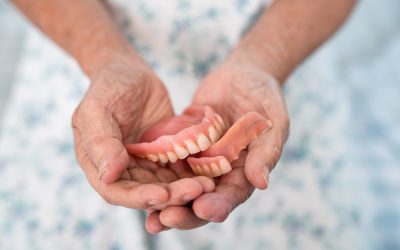Sensitive teeth are a common and irritating problem that plagues millions of people around the world. Anyone who has dug their teeth into an ice cream cone only to feel a sharp, deep rooted sting can testify to the frustration of sensitive teeth! Considering how often we use our teeth, the sensitivity can become a serious detriment to our quality of life. Thankfully, there are solutions to soothe your aching teeth.
Why Are Some Teeth Sensitive?
Sensitive teeth are usually an indicator of some mild damage to the enamel of your teeth. Enamel is the hard, outer coating on your teeth that is responsible for physically protecting them from damaging foods and drinks. It keeps any foreign materials from reaching the roots and nerves of your teeth, where they can cause aggravation. When tooth enamel is damaged, tiny hollow tubes and canals can be exposed on the surface of your tooth. The canals provide a direct pathway for anything in your mouth to reach the nerves in your teeth.
Generally, the same substances and conditions that are already unhealthy for your teeth are the ones that aggravate your dental nerves. The penetration of acidic foods and alcoholic substances can easily cause pain, as can excessively cold or hot stimuli. Note that teeth may become sensitive from an acute injury as well, such as a tooth crack or decay around a filling.
What Activities Can Aggravate Sensitive Teeth?
One of the most common culprits for aggravating sensitive teeth is overbrushing. Excessive brushing of tooth enamel can wear it down over time, and cause recession of the gum line. Even normal brushing can have these unintended consequences if the bristles of your toothbrush are too firm. Enamel can also be worn down in a similar fashion if you are prone to grinding your teeth, or using excessive amounts of toothpaste. Generally, any overly abrasive medium that comes into contact with your teeth can carry a significant risk of aggravating sensitivity.
In addition, diet can play a big role in aggravating sensitivity. Excessively cold and hot beverages and foods, while aggravating to your tooth sensitivity, are generally harmless. Highly acidic delicacies, on the other hand, are both aggravating and damaging, and should be avoided when possible.
Finally, certain dental procedures and conditions can easily cause additional aggravation to individuals with teeth that are pre-disposed to sensitivity. Patients with dental diseases of varying kinds, or cracked and decaying teeth, will often complain of sensitivity.
What Remedies Are Available for Sensitive Teeth?
The best remedies for overly sensitive teeth are often preventative. Acquiring a soft bristled toothbrush and using a lighter touch in your daily oral care can work wonders for improving the sensitivity of your teeth,

in addition to many other dental ailments. Monitoring and reducing the amount of time you spend grinding your teeth will also make marked improvements. Furthermore, avoiding acidic and alcoholic beverages and foods allows your teeth to slowly repair themselves (With adequate dental care).
Switching from an alcohol based mouthwash to a fluoride based one will not only remove an aggravating substance, but also nourish your teeth. Finally, consider moving to a toothpaste formulated to help with sensitive teeth. As always, don’t forget about routine brushing and flossing!





